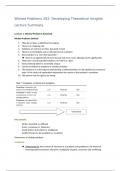Wicked Problems 202: Developing Theoretical Insights
Lecture Summary
Lecture 1: Wicked Problems Revisited
Wicked Problems Defined
1. They do not have a definitive formulation
2. There is no stopping rule
3. Solutions are not true-or-false, but good-or-bad
4. There is no immediate and no ultimate test of a solution
5. Every solution is a “one-shot operation”
There is no opportunity to learn by trial-and-error, every attempt counts significantly
6. They have a set of potential solutions, nor there is a plan
7. Every wicked problem is essentially unique
8. Can be considered a symptom of another problem
9. The existence of a discrepancy representing a wicked problem can be explained in numerous
ways the choice of explanation determines the nature of the problem’s resolution
10. The planner has no right to be wrong
Four sources:
- Parties: bounded vs. diffused
- Issues: consensus vs. dissensus
- Social System: prescribed vs. ambiguous
- Conflict Processes: de-escalated vs. escalated
Dimensions of wicked problems:
Complexity
Determined by: the number of elements of a problem (sub-problems), the extent of
interdependence between elements, multiplicity of paths, outcomes and conflicting
, interdependencies of path, level of newness of (sub)problems, level/diversity of
knowledge needed, causal ambiguity
Uncertainty
Substantive Uncertainty: lack of knowledge about a problem
Strategic Uncertainty: how will other actors/agents decide and behave?
Institutional Uncertainty: what jurisdictions are affected, who is involved (and who is not),
and how are they related?
Value Divergence: what is value?
- Value content: specific dimensions or types of values
- Value content intensity: relative emphasis an individual or group puts on different value
dimensions
- Value congruence: degree of value similarity across group members
- Value content impact: polity, politics, policy
5 psychological systems that provide the foundations for the worlds many moralities:
1. Harm/care
Ethic of autonomy
2. Fairness/ reciprocity
Ethic of autonomy
3. Ingroup/ loyalty
Ethic of community
4. Authority/ respect
Ethic of community
5. Purity/ sanctity (disgust)
Ethic of divinity
,These are psychological preparations for detecting and reacting emotionally to issues. These systems
evolved through evolutionary processes. These systems can be contradictory, for example if
compassion (harm/care) is weakened by ingroup/loyalty or purity/sanctity
Wicked problem dimensions: 1) complexity, 2) uncertainty, 3) value divergence
The role of power and political interests
Divergence and fragmentation in viewpoints, values and strategic intentions become only active
when combined with power and political interests.
Power: social and political control exercised by particular agents, the actor within a social relationship
is in the position to carry out their will despite resistance, regardless of the basis on which this
probability rests
Political Interest: attention, motivation, policy preferences and goals of an actor
Competitive strategies (power is dispersed and contested)
Zero-sum game logic
Power is contested, search for power
Winner gets to define problem and solution
Advantage = competition can stimulate solution generation
Disadvantages = pushed to the extreme they can lead to violent conflicts, can lead to decision
blockades, to spending resources for competing instead of dealing with the problem
In democracies: party competition and free elections
Collaborative strategies (power is dispersed but not contested)
- “win-win view” of problem solving
- Pooling of resourcing, competencies and skills
- Risk and burden sharing
- Reduction of redundancies and inefficiencies
- Collaboration requires skills and practice
- Disadvantage = increasing coordination and transaction costs
Nowadays global environmental problems have the following characteristics: 1) time is running out,
2) those who cause the problem also seek to provide a solution, 3) the central authority needed to
address them is weak or non-existent, 4) irrational discounting occurs that pushes responses into the
future
, Strategies:
o Develop measures that constrain future behaviour to achieve desirable longer-term social
benefits
o Identify and implement opportunities for initiating policy change capable of unlocking
progressive incremental trajectories that accumulate over time
o Break and set up new path dependency processes: lock in, self-reinforcing, increasing returns,
positive feedback
Shortcomings of the generic wicked problems discourse:
The concept is in danger of being overused, most major policy problems resist a clear and agreed
solution.
The tendency for ‘totalizing’ or even ‘admiring’ the problem, closing possibility of identifying those
elements that can be influenced. ‘Apocalyptic perspective’, which requires dramatic transformative
interventions and closes the possibility for long-term smaller interventions.
Invokes a perception of either success or defeat instead of making progress toward better managing
them.
To call the ‘solving’ of these problems is to set up a standard that is impossible and perhaps
unnecessary. Binary conception instead of thinking about degrees of wickedness. Binary conception
prevents developing a contingency framework that allows for tailoring solutions.




